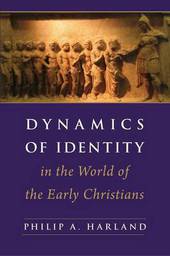
|
Dynamics of Identity in the World of the Early Christians
Paperback / softback
Main Details
| Title |
Dynamics of Identity in the World of the Early Christians
|
| Authors and Contributors |
By (author) Assistant Professor Philip A. Harland
|
| Physical Properties |
| Format:Paperback / softback | | Pages:256 | | Dimensions(mm): Height 234,Width 156 |
|
| Category/Genre | History of religion
Biblical studies |
|---|
| ISBN/Barcode |
9780567111463
|
| Classifications | Dewey:270.1 |
|---|
| Audience | |
|---|
| Illustrations |
10
|
|
Publishing Details |
| Publisher |
Bloomsbury Publishing PLC
|
| Imprint |
T.& T.Clark Ltd
|
| Publication Date |
19 January 2010 |
| Publication Country |
United Kingdom
|
Description
This study sheds new light on identity formation and maintenance in the world of the early Christians by drawing on neglected archaeological and epigraphic evidence concerning associations and immigrant groups and by incorporating insights from the social sciences. The study's unique contribution relates, in part, to its interdisciplinary character, standing at the intersection of Christian Origins, Jewish Studies, Classical Studies, and the Social Sciences. It also breaks new ground in its thoroughly comparative framework, giving the Greek and Roman evidence its due, not as mere background but as an integral factor in understanding dynamics of identity among early Christians. This makes the work particularly well suited as a text for courses that aim to understand early Christian groups and literature, including the New Testament, in relation to their Greek, Roman, and Judean contexts. Inscriptions pertaining to associations provide a new angle of vision on the ways in which members in Christian congregations and Jewish synagogues experienced belonging and expressed their identities within the Greco-Roman world. The many other groups of immigrants throughout the cities of the empire provide a particularly appropriate framework for understanding both synagogues of Judeans and groups of Jesus-followers as minority cultural groups in these same contexts. Moreover, there were both shared means of expressing identity (including fictive familial metaphors) and peculiarities in the case of both Jews and Christians as minority cultural groups, who (like other "foreigners") were sometimes characterized as dangerous, alien "anti-associations". By paying close attention to dynamics of identity and belonging within associations and cultural minority groups, we can gain new insights into Pauline, Johannine, and other early Christian communities.
Author Biography
Philip A. Harland is Professor at York University, Canada, in the Humanities Department and in the collaborative U of T-York University doctoral programme in Ancient Greek and Roman History. Harland also runs a network of websites relating to Religions of the Ancient Mediterranean (http://www.philipharland.com/Blog/)
ReviewsHarland has provided a rich and broad-ranging inquiry that deserves a place in any mature library. -- Religious Studies Review In total, Harland helps us see the emergence of early Christianity with clearer lenses. . . . Harland has provided us with a text from which the seasoned scholar or the intermediate student might engage in a fresh approach to the important ancient textual and archeological material. -- Biblical Theology Bulletin - Vol. 41: 4 "Drawing from insights of the social sciences, Harland seeks to clarify certain dynamics of identity among groups of Judeans and Christians by looking at archaeological evidence for other contemporary associations and cultural minority groups. He covers Judean and Christians identities in the context of associations, familial dimensions of group identity, identity and acculturation among Judeans and other ethnic associations, and group interactions and rivalries. Specific topics include brothers in associations and congregations, Judean families and guilds at hierapolis, associations at Sardis and Smyrna, and anti-associations and their banquets." -Eithne O'Leyne, BOOK NEWS, Inc. "Drawing on insights from the social sciences, Harland, associate professor of humanities and ancient history at York University in Toronto, and author of Associations, Synagogues, and Congregations: Claiming a Place in Ancient Mediterranean Society (2003), suggests that we can better understand certain dynamics of identity among groups of Judeans (Jews) and Christians by looking at archaeological evidence for other contemporary associations and other cultural minority groups. After a 21-page introduction, he discusses associations and group identity among Judeans and Christians; local cultural life and Christian identity--'Christbearers' and 'fellow-initiates'; 'brothers' in associations and congregations; 'mothers' and 'fathers' in associations and synagogues; other diasporas--immigrants, ethnic identities, and acculturation; interaction and integration--Judean families and guilds at Hierapolis; group rivalries and multiple identities--associations at Sardis and Smyrna; and perceptions of cultural minorities--anti-associations and their banquets. Harland concludes that among the distinctive characteristics of Christians and Judeans that stood out to many insiders and outsiders was their attention to one, Judean God to the exclusion of other deities; and that this distinction was a potential source of tensions with many other groups and individuals within their contexts, and could lead to social harassment and persecution on particular occasions." -New Testament Abstracts, Vol. 54 Until recently, scholars of early Judaism and Christianity have generally pursued the differential quality. Harland's effort to broaden that perspective by seeing what we might learn about Judeans and Christians by considering their similarities to other "cultural minority groups" in antiquity, even if it is overstated at times, therefore comes as a welcome alternative. The sharpness with which Harland presents that perspective makes it all the more rewarding. -- Journal of Religion
|